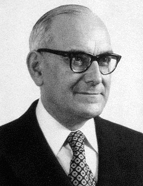

In short, from 1939, the year he became full professor, to 1968, he held all the chairs in the Political Science department. Serving in these positions allowed Marcelo Caetano to compile various textbooks, some of which are still used as reference works today. In 1936, the first edition of the Manual de Direito Administrativo (Manual of Administrative Law) was published. In that same year, the first editions of the Corso di Dirito Ammninistrativo by Guido Zanobini and Traité Élémentaire de Droit Admnistratif by Marcel Waline were also published. These were works of great importance, in that they boosted the renewal of European Administrative Law. Marcelo Caetano thus found himself part of the movement for the renewal of Administrative Law, more connected to the General Theory of Law and with an interdisciplinary approach, removing himself from the French school of positivism (Marcello Caetano – Professor da Faculdade de Direito de Lisboa, 1987, p.. 182). In 1934 he was commissioned by the Portuguese government to prepare a draft of the Administrative Code. When preparing his PhD and the professor examinations, he was required to study scattered and confusing legislation, which led him to take an interest in the problems of local administration. This research, in a historical perspective, resulted in A codificação administrativa em Portugal – Um século de experiência (1836-1935) (Administrative Codification in Portugal - A Century of Experience, 1836-1935). These works, along with his being abreast of foreign law, allowed him to lead the compilation of the Administrative Code of 1936 (Minhas Memórias de Salazar, 1977, p.61.)
Also in the 1930s, Marcelo Caetano became acquainted, in the truest sense of the word, with the African continent, and the impact on his legal and historical work could be felt over the subsequent years. As chair of Public Portuguese Colonial Law, he compared national legislation with that of other colonial powers, reviewing the history of Portuguese colonisation since the time of the feitorias, or trading posts. In 1935 he had his first real contact with Africa. He was appointed pedagogical director for a trip organised by the magazine Mundo Português, which aimed to visit the colonies in the ‘Atlantic Zone’. Orlando Ribeiro was one of his assistants.
